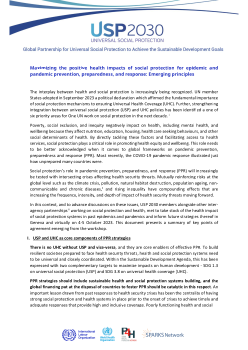Epidemics and pandemic prevention, preparedness and response: How to maximize the health impact of social protection systems?
4 and 5 October 2023 Agenda
Hybrid event at the International Labour Organization in Geneva and online
The interplay between health and social protection has emerged in various fora as one of the key priorities for accelerating progress towards achieving the Sustainable Development Goals (SDGs). This includes in particular the need to reinforce the linkages between SDG target 1.3 on universal social protection (USP) and SDG target 3.8 on universal health coverage (UHC) to maximize their impact on human development. Working in tandem, these integrated policy efforts contribute to epidemic and pandemic prevention, preparedness and response (PPR).
The workshop will be an opportunity for social protection and health practitioners working across promotion, extension of coverage and financing to reflect together on ways to maximize the health dividends of social protection policies in the context of epidemics and pandemic prevention, preparedness and response. These reflections can help build universal social protection systems, which are also critically important for a range of other health outcomes. Joint efforts can ensure that efforts underway to stop communicable diseases like TB and any future crises surrounding pandemics can be leveraged more effectively in the future to strengthen social protection systems and move towards UHC, while optimizing benefits for the efficiency, equitable uptake of public health and social measures, and health equity.
The workshop aims to take stock of the health impact of social protection systems on the prevention and response to past epidemics and pandemics, with a view to informing integrated policy design and implementation across the health and social protection sectors. In particular, the workshop will encourage participants across sectors and technical specializations to reflect upon key questions and co-construct innovative solutions. The panellists will also share relevant experiences from their diverse national contexts and seek to offer concrete steps for country level implementation.
Agenda
Access to the speakers’ biographies here
| Wednesday 4 October | |
| 8.30 – High-level opening | |
| |
Session 1 9.00 – 10.00 | Connections between social protection, employment, and the social determinants of health: Implications for epidemic and pandemic prevention, preparedness and response Synopsis: This session will set the scene to understand the connections between health, social protection and employment. A macro perspective on the interaction between the three sectors will be offered as well as concrete examples of positive engagement pathways to address the social determinants of health. Keynote: Meri Koivusalo, University of Tampere, WHO Collaborative Centre on Health in all Policies and the Social Determinants of Health Equity Panel:
|
Session 2 10.30 – 12.00 | Social protection in epidemic and pandemic prevention, preparedness and response: lessons learned Synopsis: The trajectory of social protection engagements in the fights against TB and HIV-AIDS and lessons learned and next steps will be summarized. The example of COVID-19 will be used to support a discussion on social protection as a tool to support PHSM. Stock-taking session supported by the SPARKS network Part 1: Overview of evidence
Q&A Part 2: Overview of lived experience and needs Panel:
Moderated discussion – Kofi Amekudzi, Technical Specialist, Equality and Non-Discrimination, ILO and Salla Atkins, Professor, Tampere University Q&A Wrap up: Kroum Markov, Social Protection Policy Specialist, ILO |
Session 3 13.30 – 16.30 | Design and implementation features of social protection systems that maximize their health impact and contribute to epidemic and pandemic PPR Synopsis: Health and social protection systems building contribute to both prevention and response to crises, including health security crises. Their close coordination can bring resilience while supporting well-being in societies. This session will explore how to improve the design and implementation of social protection schemes and systems so that they effectively promote health, especially within the context of new primary healthcare delivery models. Discussions organized across three topics, featuring country experiences and break-out group discussion on emerging principles with respect to social protection coverage, design and implementation features. Topic 1 – Covering the informal economy as an element of prevention and preparedness
Topic 2 – Social protection benefits crucial to support health
Topic 3 – Coordinated delivery and referral across social protection and health systems
Group discussion Wrap up: Veronika Wodsak, Social Protection Policy Specialist, ILO |
| Thursday 5 October | |
Session 4 9.00 – 10.30 | PPR financing, a catalyst for integrated social protection and health systems building? Synopsis: Financing is required for pandemic/epidemic PPR at both national and global levels. While an impressive amount of funding was mobilized for social protection in the framework of the COVID-19 response, it remains unclear to what extent it fostered a coordinated response and contributed to reinforcing health and social protection systems. This session will reflect on the scope of PPR financing and related challenges and opportunities for systems building. Participatory session facilitated by the P4H network Technical Exchange Group. Introduction:
Break-out group discussion Conclusion: Christina Behrendt, Head, Social Policy Unit, ILO |
Session 5 11.00 – 12.30 | Adopting a rights-based approach: why are legal frameworks key to coordinated prevention, preparedness and response across health and social protection systems? Synopsis: The session will focus on the importance of legal frameworks and their alignment with international standards for human-centred prevention, preparedness and response, including within the framework of the discussion on a new pandemic treaty. The session will lay out key principles for legal frameworks to foster coordination and integrated action across health and social protection sectors.
Discussion: Gianandrea Nelli Feroci, Research and Learning Manager, IDLO Conclusions: Stéphanie Dagron, Professor, UNIGE |
| Wrap-up and next steps | |
| |
